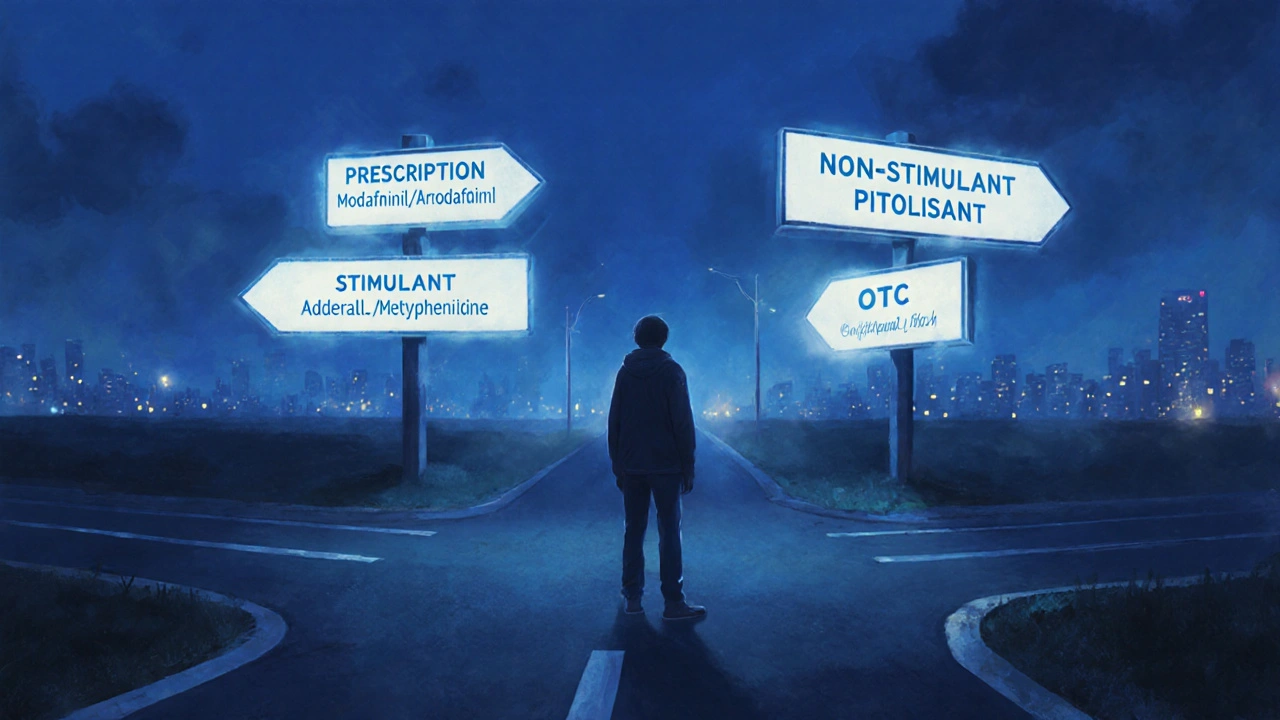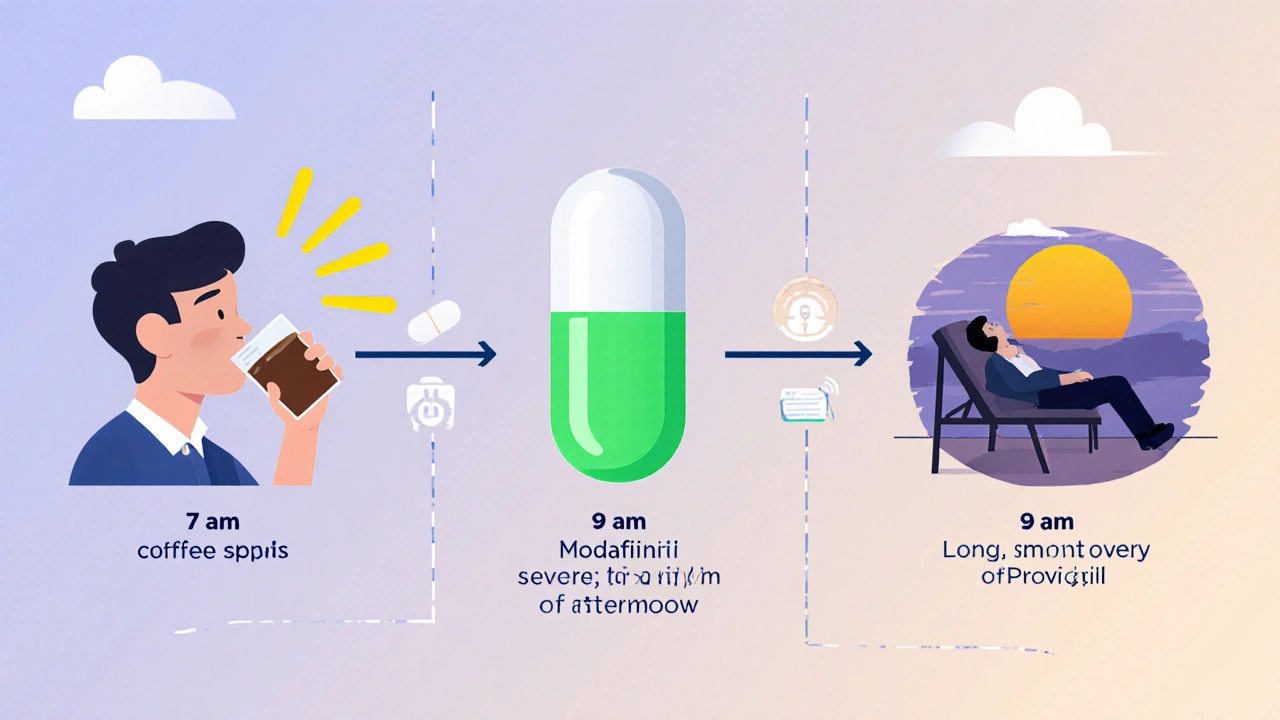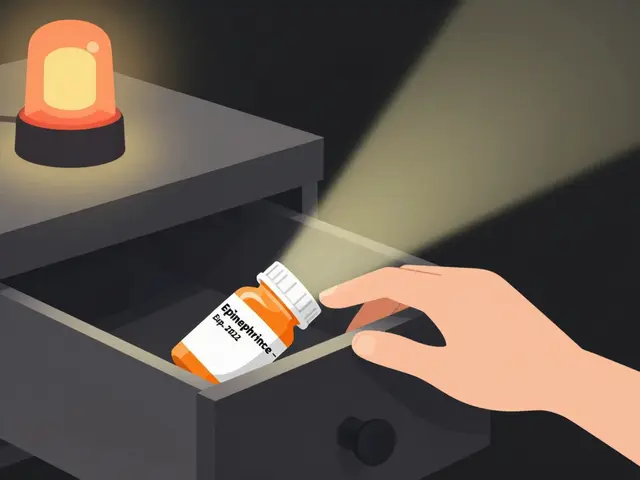Provigil vs. Alternatives Decision Guide
Recommended Options
Quick Summary / Key Takeaways
- Provigil (Modafinil) is a prescription wake‑promoting agent, most effective for narcolepsy and shift‑work sleep disorder.
- Armodafinil, Adrafinil, Pitolisant and stimulant medications each offer a different balance of onset speed, duration, and side‑effect profile.
- If you need a non‑stimulant option with fewer cardiovascular concerns, Pitolisant or Armodafinil are solid picks.
- Stimulants such as Methylphenidate and Amphetamine‑dextroamphetamine work faster but carry higher abuse potential.
- Over‑the‑counter choices like Caffeine or L‑theanine can help mild daytime sleepiness, but they don’t replace prescription treatments for severe disorders.
When you hear the name Provigil (Modafinil) is a wake‑promoting medication approved for narcolepsy, shift‑work sleep disorder and obstructive sleep apnea‑related sleepiness. It’s become a household name for people who need a clear‑headed boost without the jittery feeling you get from coffee. But the market is crowded - there are newer drugs, older off‑label options, and even some legal supplements that promise similar results. This guide breaks down the most common alternatives, compares key attributes, and helps you decide which one aligns with your health goals, lifestyle, and budget.
How Provigil (Modafinil) Works
Modafinil’s exact mechanism isn’t fully understood, but researchers agree it enhances dopamine signaling by inhibiting the dopamine transporter (DAT). It also nudges histamine, orexin and norepinephrine pathways, creating a broad‑spectrum alertness effect. Because it doesn’t act as a classic stimulant, the surge in blood pressure and heart rate is modest, making it a go‑to for patients who can’t tolerate amphetamines.
Typical dosing in the UK starts at 200mg taken once daily in the morning. Food can delay absorption slightly, so most clinicians advise an empty‑stomach intake. The drug reaches peak plasma levels in about 2-3hours and maintains therapeutic concentrations for 12‑15hours, covering a full workday.
Top Alternatives Overview
Below are the eight most frequently discussed alternatives. Each entry includes the first‑time microdata markup so search engines can readily identify the entity.
Armodafinil (Nuvigil) is the R‑enantiomer of Modafinil, offering a slightly longer half‑life and a smoother evening profile.
Adrafinil is a pro‑drug that converts to Modafinil in the liver, sold over the counter in some countries but not approved by the MHRA.
Pitolisant (Wakix) is a histamine H₃‑receptor inverse agonist, the only non‑dopaminergic wake‑promoter on the market.
Methylphenidate (Ritalin) is a central nervous system stimulant that blocks dopamine and norepinephrine reuptake.
Amphetamine‑dextroamphetamine (Adderall) is a mixed‑amphetamine formulation widely used for ADHD and off‑label for excessive daytime sleepiness.
Caffeine is the world’s most consumed psychoactive substance, acting as an adenosine receptor antagonist.
L‑theanine is an amino acid found in tea leaves that promotes relaxation without drowsiness and can smooth out caffeine spikes.

Side‑by‑Side Comparison Table
| Drug / Substance | Mechanism | FDA‑approved Uses (UK equivalents) | Typical Dose | Onset | Duration | Prescription Status | Average UK Cost (per month) | Common Side Effects |
|---|---|---|---|---|---|---|---|---|
| Provigil | Dopamine transporter inhibition, histamine boost | Narcolepsy, shift‑work sleep disorder, OSA‑related sleepiness | 200mg once daily | 30‑60min | 12‑15hr | Prescription (ScheduleIV) | ≈£120‑£150 | Headache, nausea, insomnia |
| Armodafinil | Same as Modafinil, longer half‑life | Narcolepsy, shift‑work disorder, OSA | 150mg once daily | 30‑60min | 15‑18hr | Prescription (ScheduleIV) | ≈£140‑£170 | Dry mouth, anxiety, dizziness |
| Adrafinil | Pro‑drug → Modafinil | Off‑label cognitive enhancement | 300‑600mg daily | 60‑90min | 12‑14hr | OTC (unregulated) | ≈£30‑£50 (bulk) | Liver enzyme elevation, insomnia |
| Pitolisant | Histamine H₃‑inverse agonist | Narcolepsy (excessive daytime sleepiness) | 10‑40mg once daily | 45‑60min | 10‑12hr | Prescription (ScheduleIII) | ≈£200‑£250 | Insomnia, anxiety, rare QT prolongation |
| Methylphenidate | Dopamine & norepinephrine reuptake inhibitor | ADHD, narcolepsy (off‑label) | 10‑60mg divided 2‑3×/day | 15‑30min | 3‑5hr (IR), 8‑12hr (ER) | Prescription (ScheduleII) | ≈£50‑£80 | Appetite loss, insomnia, tachycardia |
| Amphetamine‑dextroamphetamine | Increases synaptic dopamine & norepinephrine | ADHD, narcolepsy (off‑label) | 5‑30mg 1‑2×/day | 20‑40min | 4‑6hr (IR), 10‑12hr (XR) | Prescription (ScheduleII) | ≈£60‑£90 | Elevated BP, insomnia, dependence risk |
| Caffeine | Adenosine receptor antagonist | General alertness, occasional fatigue | 100‑200mg (1‑2 cups coffee) | 5‑15min | 3‑5hr | OTC | Negligible cost | Jitters, GI upset, sleep disruption |
| L‑theanine | Promotes alpha‑wave activity, reduces cortical excitability | Stress reduction, caffeine smoothing | 100‑200mg 1‑2×/day | 30‑45min | 8‑10hr | OTC (dietary supplement) | ≈£15‑£25 | Rare headache, mild GI changes |
Choosing the Right Option for You
Every alternative shines under different circumstances. Here’s a quick decision‑tree you can run in your head:
- Do you need a prescription? If you’re comfortable visiting a GP or neurologist, Provigil, Armodafinil, Pitolisant, Methylphenidate or Adderall are all viable. If you prefer OTC routes, Caffeine, L‑theanine, or even Adrafinil (where legal) make sense.
- Is a fast onset critical? Stimulants (Methylphenidate, Adderall) kick in within 15‑30minutes. Modafinil family drugs need about an hour. Caffeine works instantly but lasts less than five hours.
- How long do you need coverage? For a full 12‑hour shift, Provigil or Armodafinil are ideal. For shorter bursts (e.g., exam prep), a stimulant or caffeine might be enough.
- Any cardiovascular concerns? Non‑stimulants (Modafinil, Armodafinil, Pitolisant) have a milder impact on blood pressure than amphetamines.
- Budget constraints? Generic Modafinil and Methylphenidate are the cheapest prescription options in the UK. Caffeine and L‑theanine are the lowest cost overall.
Remember to factor in drug‑drug interactions. For example, Modafinil induces CYP3A4 enzymes, potentially lowering the effectiveness of oral contraceptives or certain antiretrovirals. Pitolisant, on the other hand, can increase the plasma level of drugs metabolised by CYP2D6.

Potential Pitfalls & Safety Considerations
Even though many of these agents feel “safe,” they each carry specific warnings:
- Modafinil/Armodafinil: Rare but serious skin reactions (Stevens‑Johnson syndrome). Liver function tests are recommended for long‑term users.
- Adrafinil: Because it’s metabolised in the liver, prolonged high‑dose use can stress hepatic enzymes. Regular liver panels are a must.
- Pitolisant: May prolong QT interval in patients with existing cardiac issues; an ECG is advisable before initiation.
- Stimulants (Methylphenidate, Adderall): Heightened risk of hypertension, arrhythmia, and dependence. Not suitable for anyone with a history of substance misuse.
- Caffeine: Over‑consumption (>400mg/day) can trigger palpitations and exacerbate anxiety disorders.
- L‑theanine: Generally well‑tolerated, but high doses might cause mild hypotension in rare cases.
If you’re pregnant, breastfeeding, or have chronic kidney disease, always check with a clinician before starting any of the above.
Frequently Asked Questions
Can I use Modafinil as a study aid without a prescription?
In the UK, Modafinil is a prescription‑only medicine. Using it off‑label without a doctor’s approval is illegal and can expose you to unmonitored side effects. If you need cognitive support, consider legal options like caffeine combined with L‑theanine, or discuss legitimate medical reasons with your GP.
Is Armodafinil stronger than Modafinil?
Armodafinil is the R‑enantiomer of Modafinil, which gives it a slightly longer half‑life. The “strength” feels similar, but you may notice a steadier wakefulness into the evening, making it a better fit for late‑shift workers.
Do stimulants raise my risk of heart attacks?
Stimulants can increase blood pressure and heart rate, which may elevate cardiovascular risk, especially in people with pre‑existing conditions. A baseline ECG and regular BP checks are recommended before starting a stimulant regimen.
Is Pitolisant suitable for someone with depression?
Pitolisant works on histamine pathways and does not directly affect dopamine in the same way as stimulants. It’s generally considered neutral for mood, but any new medication should be introduced under psychiatric supervision if you have a mood disorder.
Can I combine caffeine with Modafinil?
Adding caffeine may heighten jitteriness and insomnia, especially if you take Modafinil later in the day. Many clinicians suggest limiting caffeine to the morning when using Modafinil to avoid overlapping peaks.
Bottom line: Provigil remains a solid, well‑studied choice for many sleep‑related conditions, but alternatives give you flexibility based on speed, duration, cost and safety. Talk to your healthcare provider, weigh the pros and cons laid out here, and pick the option that fits your daily rhythm.




Jason Petersen
October 10, 2025 AT 20:28Modafinil looks shiny on paper but the data is riddled with cherry‑picked studies it masks the real hassle of liver enzyme spikes and sleep rebound we see in real‑world users
Melissa Gerard
October 15, 2025 AT 19:08Sure, popping a prescription for a coffee buzz is totally ethical… not 😒
Cindy Knox
October 20, 2025 AT 17:48Hey, I get where you’re coming from but let’s not forget that many folks actually experience a clearer headspace with Modafinil compared to the jittery crash of caffeine – it’s like swapping a roller coaster for a smooth glide through the day.
beverly judge
October 25, 2025 AT 16:28For anyone weighing options, consider the half‑life, cardiovascular profile, and your daily schedule. Modafinil and Armodafinil both offer long coverage with low heart‑rate impact, while stimulants such as Methylphenidate act faster but can raise blood pressure. Checking liver function before starting a pro‑drug like Adrafinil is wise, and always discuss potential drug interactions with your prescriber.
Capt Jack Sparrow
October 30, 2025 AT 14:08Alright mate, let me break down why the Modafinil family dominates the wake‑promoting game.
First off, the pharmacokinetics are solid – you get a peak around two hours and a 12‑15 hour window that rides out most work shifts.
Second, because it’s not a classic amphetamine, the sympathetic surge is modest, meaning you won’t end up with the classic jitter‑jolt that coffee addicts love to hate.
Third, the side‑effect profile is surprisingly tame; most users just complain about a mild headache or occasional insomnia if they take it too late.
Fourth, the cost in the UK hovers around £120‑£150 a month for the generic, which is actually cheaper than a daily prescription of Adderall when you factor in the dosage.
Fifth, the drug induces CYP3A4, so if you’re on oral contraceptives or certain antivirals you’ll need a dosage tweak.
Sixth, there’s solid evidence for narcolepsy and shift‑work, but off‑label use for studying or gaming is widespread – just remember it’s still prescription‑only.
Seventh, the R‑enantiomer Armodafinil stretches the half‑life a bit, giving you up to 18 hours of alertness without a big crash.
Eighth, if you’re worried about liver health, a periodic panel is cheap insurance, especially if you ever dabble with Adrafinil.
Ninth, compared to stimulants like Methylphenidate, the abuse potential is lower, though not zero.
Tenth, the legal landscape is clear: keep it to a licensed pharmacy, avoid grey‑market sources that might ship counterfeit pills.
Eleventh, combining it with caffeine can be a double‑edged sword – a little morning brew can smooth the wake‑up, but too much can push you into insomnia.
Twelfth, many users report that the “clear‑headed” feel is superior for creative work, unlike the hyper‑focus of amphetamines that can feel tunnel‑visioned.
Thirteenth, if you have hypertension, start low and monitor; the drug itself isn’t a major hypertensive agent but the stimulatory effect can creep up.
Fourteenth, insurance coverage varies – some NHS trusts will cover it for diagnosed narcolepsy, but you may need a specialist letter.
Finally, as with any brain‑active compound, listen to your body and keep open communication with your doctor; the goal is sustainable alertness, not a crash‑and‑burn binge.
Manju priya
November 4, 2025 AT 12:48Dear readers, embarking on a journey towards optimal daytime alertness requires both informed choices and disciplined habits. By reviewing the comparative data, you empower yourself to select a regimen that aligns with health goals, occupational demands, and financial considerations. Stay committed, track your response, and consult your physician regularly – success is a marathon, not a sprint 😊
Jesse Groenendaal
November 9, 2025 AT 11:28We shouldn’t glorify any drug as a miracle solution it’s a shortcut that can mask underlying sleep hygiene problems and create dependency we owe it to ourselves to prioritize natural rest over chemical crutches
Persephone McNair
November 14, 2025 AT 10:08When we deconstruct the neuropharmacological matrix of wake‑promoting agents, the dopaminergic tone modulation via DAT inhibition in modafinil versus the H3‑inverse agonism of pitolisant is a pivotal determinant of downstream cortical arousal states – personally I’ve seen colleagues misuse this nuanced distinction as a badge of “elite” knowledge, which borders on gatekeeping in our community.
Murhari Patil
November 19, 2025 AT 08:48Listen up – the pharma giants have engineered the narrative that Modafinil is the safe, “non‑stimulant” hero while quietly funneling research money into hidden trials that downplay cardiovascular flags. Every new “alternative” is just another layer in the grand design to keep us dependent on patented solutions that line corporate pockets.
kevin joyce
November 24, 2025 AT 07:28It’s fascinating how our perception of wakefulness mirrors the broader quest for consciousness itself. When we choose a pharmacological ally, we’re not merely adjusting neurotransmitters; we’re navigating the delicate balance between agency and chemical determinism. In that sense, each option – be it modafinil, pitolisant, or a humble cup of tea – becomes a philosophical statement about how we wish to experience the flow of time.
michael henrique
November 29, 2025 AT 06:08Our country deserves home‑grown solutions not imported drugs that profit foreign conglomerates – support local research and demand transparency now.
Jamie Balish
December 4, 2025 AT 04:48Hey folks, I love how this thread brings together a spectrum of experiences – it’s like a living guidebook for anyone wrestling with daytime sleepiness. First, shout‑out to those who’ve tried the classic modafinil regimen and found a reliable boost; your anecdotes help set realistic expectations. Second, for the night‑owls who need that extra hour of focus, armodafinil’s extended half‑life is a game‑changer that many of us overlook. Third, let’s not ignore the underrated duo of caffeine plus L‑theanine – that combo can smooth the jitters while keeping you alert for study marathons. Fourth, I’ve seen colleagues transition from stimulants to pitolisant after heart‑rate concerns, and they report a steadier mood without the crash. Fifth, budgeting is real – the price gap between generic modafinil and premium pitolisant can be staggering, so weighing cost against benefit is essential. Sixth, remember to schedule your doses early in the day; the later you take, the higher the risk of insomnia stealing your night. Seventh, always flag potential drug interactions with your doctor – especially if you’re on antidepressants or hormonal therapies. Eighth, for those with liver concerns, avoiding adrafinil is wise because it’s metabolized heavily in the liver. Ninth, mental health matters – if you notice heightened anxiety on any stimulant, consider a non‑stimulant alternative or adjust the dose. Tenth, share your experiences here; community wisdom beats isolated trial and error. Eleventh, keep an eye on emerging research – new H3 antagonists are on the horizon and might reshape the landscape. Finally, stay supportive, stay curious, and keep pushing for the best version of yourself with informed choices.
Jeff Bellingham
December 9, 2025 AT 03:28The comparative table is thorough yet could benefit from clearer labeling of “price per dose” rather than monthly averages, as this would aid readers in precise budgeting.
Matthew Balbuena
December 14, 2025 AT 02:08Yo dude, totally get the vibe – modafinil can be a solid pick if ya need that long haul focus, just make sure u check in with ur doc ‘cause liver stuff can be sneaky.
michael abrefa busia
December 19, 2025 AT 00:48Great rundown! 👍💡 Keep the knowledge flowing, and thanks for the clarity! 🙏😊
Bansari Patel
December 23, 2025 AT 23:28While I appreciate the balanced overview, let’s cut the fluff – anyone ignoring the cardiovascular red flags on stimulants is just courting danger, and that’s not a “personal choice” it’s a public health issue.
Rebecca Fuentes
December 28, 2025 AT 22:08From a cross‑cultural perspective, it is noteworthy that certain regions emphasize traditional remedies such as green tea for mild alertness, whereas Western practices rely heavily on pharmacological agents. Integrating these approaches could foster a more holistic management of daytime sleepiness.
Jacqueline D Greenberg
January 2, 2026 AT 20:48Hey all, just wanted to say that no matter which option you go for, you’re not alone – we’ve got each other’s backs in this wake‑up journey.
Jim MacMillan
January 7, 2026 AT 19:28One must recognize that the nuanced pharmacodynamics of modafinil place it a tier above pedestrian stimulants; discerning professionals will invariably opt for the superior mechanism of action. 🌟🧠